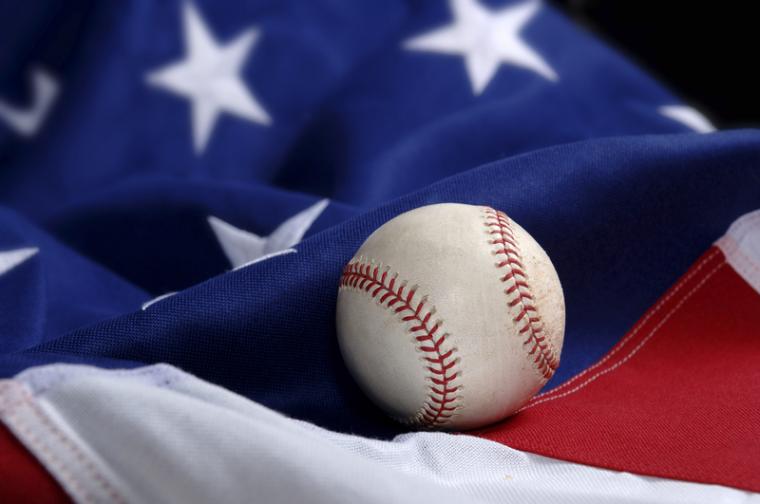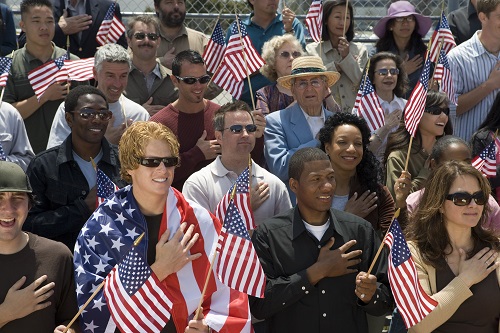

With the Summer Olympics beginning later this month — and a strong Team USA competing in Tokyo — we’re bound to hear “The Star Spangled Banner” quite a bit over the next few weeks. If lawmakers in numerous states get their way, we’ll also be hearing the song at youth sports games.
Wisconsin Sen. Patrick Testin, a Republican from Stevens Point, has proposed a bill that would require the anthem to be played prior to all sporting events taking place in taxpayer-funded facilities. Thebill “is written broadly and doesn’t specifically target professional, college or youth sports,” according to the Stevens Point Journal. Nor does it “mandate player or spectator participation in the anthem.”
A similar bill was signed into law by Louisiana Gov. John Bel Edwards, effective Aug. 1. State Sen. Sharon Hewitt, the Republican who authored the bill, says the playing “The Star Spangled Banner” is more than a patriotic gesture. “This give us an opportunity to teach to our children to respect and honor our veterans, to know the words to the national anthem, and it allows communities to be very creative in terms of how they might choose to play or sing the national anthem,” she said.
Testin reportedly wrote his Wisconsin bill earlier this year in response to Mark Cuban, owner of the NBA’s Dallas Mavericks, refusing to play the anthem at home games. The NBA overrode him by issuing a short statement that read, in full: “With NBA teams now in the process of welcoming fans back into their arena, all teams will play the national anthem in keeping with longstanding league policy.”
Texas Gov. Greg Abbott went a step further in June, when he signed a new law that “will require all new financial contracts between professional sports teams and government agencies to include a ‘written verification’ promising to play the national anthem at the teams’ home stadiums,’” according to Forbes.com. “If teams violate these written agreements, their contracts with the government will go into default, possible leading to financial penalties.”
Not everyone is happy about all this.
“I believe the national anthem is even more meaningful when it is played freely, not as a result of legal compulsion,”Texas Rep. John Turner, a Democrat who called that state’s bill “likely unconstitutional” before it was passed, noting in a statement that it “would change our anthem from something that is played and sung voluntarily at professional sporting events to something that is done because it is mandated by law.”
WisconsinExaminer.com reports that a statewide parks and recreation association has spoken out against the national anthem proposal in the Badger State:
The Wisconsin Park and Recreation Association — made up of more than 1,200 park officials across the state who hold thousands of sporting events every year — normally advocates for state stewardship of public lands and increased local government funding. But after the introduction of this bill in March, the group sent a letter to the Senate Committee on Government Operations, Legal Review and Consumer Protection to push for an amendment to the bill that would exempt facilities with capacity under 500 people.
“Our members wholeheartedly support the playing or singing of the national anthem at games and events,” the letter states. “However, depending on the appropriate venue and league level, this administratively could be unmanageable. Would equipment be needed at every youth sports game on local fields? How could this affect the timing of keeping activities on schedule? Would a recreational staff person have to attend each game to ensure the anthem is played? Would we need to add more staff to ensure compliance?”
The letter also asks how officials of youth sports tournaments would follow the law. If there are 50 soccer games happening in one day at a public park, does the anthem need to be played before every game, or just at the beginning?
According to WisconsinExaminer.com, that state’s bill does not include any enforcement mechanisms. Hewitt said she believes that in Louisiana, “managing organizations will establish a set of rules for those folks that are using their venues to do it.”
For the past several years, athletes from former NFL quarterback Colin Kaepernick to U.S. Olympic hammer thrower Gwen Berry have knelt or turned away during the playing of the national anthem — behavior that has incited both fervent outcry and support.
“National anthems are political,” Marc Ferris, author of the book Star-Spangled Banner: The Unlikely Story of America’s National Anthem, told USA TODAY Sports. “Sports are a kind of bloodless warfare, a sort of war without death. We’re a patriotic country, and we’re different from the rest of the world in that respect. As we grew and prospered, people wanted to show their patriotism.”
Which is why the song Francis Scott Key wrote in 1814 has attained such high status at sporting events, beginning in the mid-19th century.
“It became a kind of obligatory, essential community need to have “The Star Spangled Banner” played at every sporting event, to the point where it became a focus of the game,” national anthem expert Mark Clague told NPR.org in 2018.
In February 2021, in the wake of Cuban’s announcement to stop playing the song, a Morning Consult poll found that 76 percent of Americans favor having “The Star Spangled Banner” played or performed before sporting events. More than three-quarters of those self-identified as sports fans.

